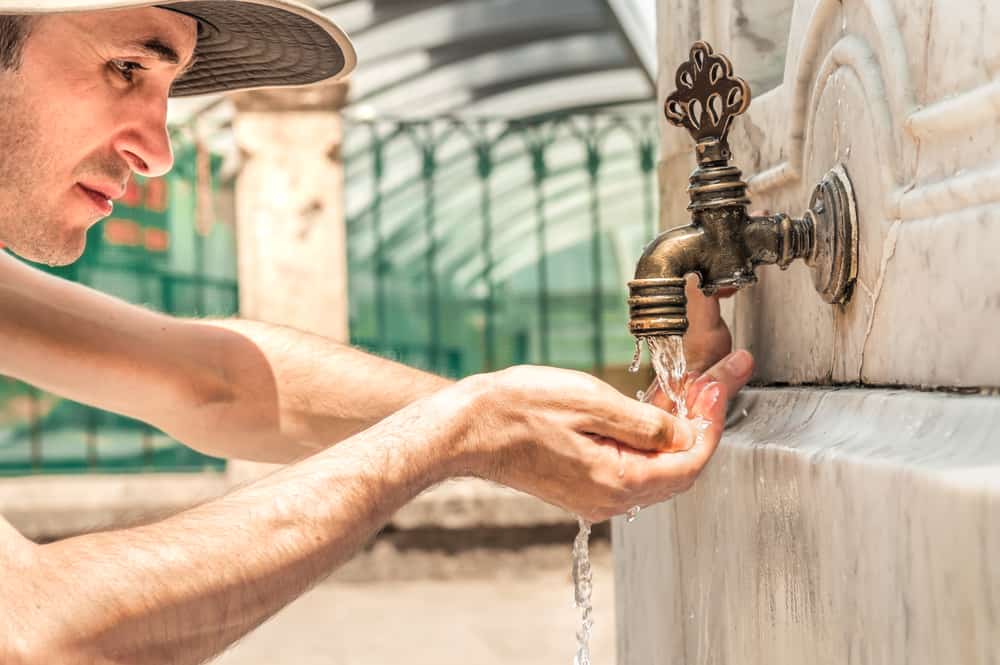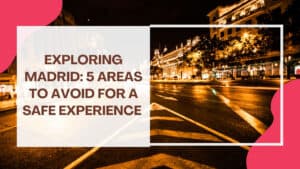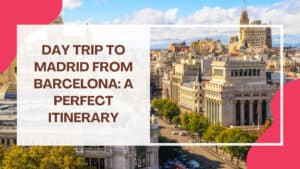Staying Hydrated in Madrid: Is Tap Water Safe to Drink?
Yes, the tap water in Madrid is safe to drink.It meets the European Union’s standards for clean drinking water. However, some tourists may find its taste different due to its high mineral content.
Visiting Madrid, or planning on it soon? You’ll want to make sure you have a hydration plan!
Still, we know you might still have questions or concerns, so you’ll get the full rundown in this article.
We’ll cover everything you need to know about drinking water in Madrid, general safety tips, and more! You can expect to learn:
- All about Madrid’s water system
- Tap water alternatives
- How to stay safe when using tap water.
Let’s get into it so you don’t have to stay thirsty!

Overview Of Madrid’s Drinking Water System
Madrid has a very safe and modern water collection, treatment, and distribution system! The water is managed by the Canal de Isabel II company.
- First, they collect water from surface sources like the Lozoya and Jarama-Sorbe rivers, as well as underground reservoirs. The water from these sources is generally very high quality.
- Next, the water is treated at drinking water treatment stations. The water is pre-oxidized (removing both organic and inorganic material) and goes through coagulation and flocculation (which separates out remaining non-water particles).
- Then, the water settles, in which the material sinks to the bottom and is then removed, filtered, neutralized (so it’s not acidic), and disinfected.
The potable water is then distributed through a series of well-maintained regulating tanks, lifting stations, and pipes – at the end of which it eventually reaches people’s homes and commercial establishments.
The water in Madrid is regularly tested and monitored to ensure it meets strict safety standards.
Alternatives To Tap Water
If you’re still feeling squeamish about drinking tap water in Madrid (or just prefer not to), there are plenty of other options available:
Bottled Water
You can get bottled water at many places in the city. It may be slightly more expensive in touristy areas and at market stalls (around two euros), but it’s typically less than a euro from the supermarket.
Filtered Water Pitchers
If you’re planning a longer stay, you could invest in a filtered water pitcher! They leave you with clean, sweet-tasting water – even better than the already high-quality tap water!
Water Filters/Faucet Attachments
You can also get a water filter that goes directly onto your water tap. While these typically aren’t as meticulous as the filters in pitchers, they’re a lot faster.
Mineral Water
Mineral water is also readily available in Madrid if you’re after something with a different flavor!
Spain’s most popular choice is Vichy Catalan, a sparkling and mineral-rich water from a natural spring in Caldes de Malavella.
Boiled Water
Boiling your water is also always an option. While this isn’t necessary in Madrid (barring an official water safety notice), it never hurts! Just make sure to let it cool before drinking.
Tips For Staying Safe While Drinking Tap Water In Madrid
If you’re worried about the quality of tap water in Madrid, here are some easy tips to help:
- Boil Tap Water Before Drinking: Boiling water rids it of most microbiological impurities. Make sure to leave it at a boil for at least a full minute to be safe.
- Check If Tap Water Is Safe For Consumption With Local Authorities: The Ministerio de Sanidad is responsible for monitoring the water quality in Spain, so they’re a good first point of call.
You are likely to be notified if any emergency happens that causes the tap water to become unsafe. - Ask Your Neighbors About Their Experiences With Tap Water: Checking in with your neighbors is a good idea regardless, but they’ll be able to let you know the water safety for the specific area or even the building that you’re staying in.
- Use Water Filters Or Purifiers: If you have concerns or dislike the taste of the tap water, get a filtered pitcher or a faucet filter.
This means you’ll be able to still consume water from your home, and keep it easier on the wallet than constantly buying water. - Consider Using Bottled Water For Drinking And Cooking: If there is a water quality issue, then you may want to stick to bottled water both for drinking and cooking food.
If the water purity is compromised, it may not completely cook off when heated – making bottled water the safest option. - Verify Regular Maintenance Of Tap Water Infrastructure: Madrid has a good water sanitation system, so you’ll want to make sure you’re a part of it. Check to make sure the water you’re consuming is from an approved and monitored source.
- Look For Any Potential Water Quality Reports: Feel free to check water quality reports before you go to get the most up-to-date news about the tap water in Madrid!
- Use A Water Testing Kit To Check Water Quality At Home: Finally, you can also use a water testing kit if you want to be absolutely sure!
You can get them online, or in Madrid at supermarkets like Alcampo and home improvement stores like Brico Depôt.
FAQs
How is the water quality in Madrid Spain?
The water in Madrid is high quality and safe to drink. Some even say it is the best-tasting water in the country.
Where does Madrid get its water from?
Madrid gets its water from a mixture of surface sources and reservoirs. It runs through Canal de Isabel II for supply and treatment.
Is the water in Madrid hard or soft?
The water in Madrid may be considered hard by some, but it is one of the softest in the region. 96% of Madrid locals drink tap water, and many people report it to be the best-tasting water in the country.






